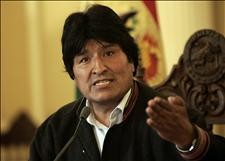
(above) Evo Morales
US House Foreign Affairs SubCommittee Calls For "Immediate High Level Dialogue" With Bolivia
House of Representatives Western Hemisphere Subcommittee Holds Hearings on Future of US-Bolivia Relations
March 4, 2009 - LatinAmerican Herald Tribune
By Latin American Herald Tribune staff
WASHINGTON, D.C. -- In a hearing today on the future of US-Bolivia relations, Congressman Eliot Engel, Chairman of the House Foreign Affairs Subcommittee on the Western Hemisphere, called for the administrations of Evo Morales and Barack Obama to "immediately initiate a high level bilateral dialogue that can quickly result in an exchange of ambassadors, a renewed strategy for joint counternarcotics efforts, and in turn, the reinstatement of Andean Trade Promotion and Drug Eradication Act (ATPDEA) benefits for Bolivia.”
Witnesses who testified at the hearing included Peter DeShazo, Director of the Americas Program at the Center for Strategic and International Studies; Kathryn Ledebur, Director of the Andean Information Network in Cochabamba, Bolivia; Ivan Rebolledo, President of the Bolivian-American Chamber of Commerce; Marcos Iberkleid, CEO of Ametex, a major Bolivian textile firm that has benefited from ATPDEA; and Jaime Daremblum, Senior Fellow and Director of the Center for Latin American Studies at the Hudson Institute.
Chairman Engel opened the hearing saying:
"I want to start today’s hearing by telling a story about a Bolivian friend of mine named Marcos Iberkleid who is testifying here today. Marcos was born in a displaced persons American military camp in post-war Germany in 1950. He moved with his family to Bolivia in 1952 and started working in a textile mill when he was 16. He went on to become the CEO of Ametex, a major Bolivian textile firm that has provided clothing to U.S. buyers, including Polo Ralph Lauren and Abercrombie and Fitch. Ametex and its employees have benefited enormously from the Andean Trade Promotion and Drug Eradication Act (ATPDEA) over the years. In fact, Ametex grew to become the largest employer in Bolivia, with over 4,000 employees.
"I visited the factory last year and was heartened to see a leading example of the tens of thousands of jobs that ATPDEA had created.
 No one can deny that ATPDEA has been a major boon to citizens in Bolivia – the poorest country in South America, and a country where 54% of the population lives in poverty with 31% earning less than $2 a day. In the case of Ametex, ATPDEA has provided quality jobs to the country’s poor, including many indigenous women who are among the most historically marginalized members of society in Bolivia and throughout the Andean region.
No one can deny that ATPDEA has been a major boon to citizens in Bolivia – the poorest country in South America, and a country where 54% of the population lives in poverty with 31% earning less than $2 a day. In the case of Ametex, ATPDEA has provided quality jobs to the country’s poor, including many indigenous women who are among the most historically marginalized members of society in Bolivia and throughout the Andean region.
"As you all know, Bolivia was suspended as an ATPDEA beneficiary country this past fall. Since then, I am told that Ametex is having enormous financial difficulties. The company will undergo massive layoffs and could even shut down. Unfortunately, Ametex is only one of several companies which will be hit hard by the suspension of the trade preferences. Indeed, the job losses could tally into the tens of thousands.
Marcos, I hope I have not previewed your testimony too much, but this is so important, and we all deserve to hear what has happened in your own words.
"Let me say that I believe there is no one in the U.S. Congress who wants more than I to see improved relations between the United States and Bolivia, and the reinstatement of Bolivia’s ATPDEA benefits.
"I met with Bolivian President Evo Morales twice last year – once in La Paz and a second time in my office here in Washington. My message to President Morales in our meetings has been consistent: please help me to help you. I want to be an advocate for Bolivia in Washington, but President Morales’s expulsion of the U.S. and Israeli Ambassadors and U.S. Drug Enforcement Administration (DEA) agents over the past six months make it increasingly difficult for me.
In particular, I have known former U.S. Ambassador to Bolivia Phil Goldberg for many years. He is a fine career diplomat, and I am certain that the Bolivian Government’s allegations against him were completely unfounded.
Finally, I was particularly troubled by President Morales’s statement at a Summit of Latin American leaders in Brazil in December that, ‘we should give the new government of the United States a deadline in order to end the embargo [on Cuba]. If the newly elected U.S. Government does not lift the economic embargo, we will lift their ambassadors out of our countries.’ This kind of rhetoric certainly does not help, especially as the Bolivian Government attempts to reach out to the Obama Administration.
"That said, I would like to see both of our countries move quickly to improve relations. But, my message to the Bolivian Government is that it takes two to tango. I urge the Morales and Obama Administrations to immediately initiate a high level bilateral dialogue that can quickly result in an exchange of ambassadors, a renewed strategy for joint counternarcotics efforts, and in turn, the reinstatement of ATPDEA benefits for Bolivia. Personal stories like that of Marcos Iberkleid and his 4,000 employees prove that time is of the essence in reinstating ATPDEA.
"I recognize that Bolivia is a sovereign country and is not required to have our DEA agents present. But, I also believe that the way in which the agents were expelled is regrettable. As we look to restore relations and reinstate ATPDEA, we must find a way to rebuild trust between our leaders and our governments. We must move beyond the constant suspicions, especially in La Paz, where the most negative inference is drawn from every action and reaction. Even if our two governments do not agree on every detail, there certainly are enough intersections of our mutual interests to allow more effective cooperation on counternarcotics and other matters.
"Evo Morales is Bolivia’s first indigenous president and is committed to lifting up impoverished people in his country. I congratulated President Morales on his personal achievements and his commitment to Bolivia’s poor each time we met. I come from a working class background and would like to help President Morales and other leaders in Latin America roll back poverty and create jobs. Yet, I truly believe that President Morales’s commitment to Bolivia’s poor could in part be shown by a renewed effort from his government to improve relations with the U.S., which I hope would in turn lead to the return of Bolivia’s ATPDEA benefits.
"I am now pleased to introduce our distinguished witnesses. Peter DeShazo is the director of the Americas Program at the Center for Strategic and International Studies (CSIS). Kathryn Ledebur is the director of the Andean Information Network which is based in Cochabamba, Bolivia. Ivan Rebolledo is the president of the Bolivian-American Chamber of Commerce in New York. Marcos Iberkleid is, of course, the CEO of Ametex. And, last but not least, Jaime Daremblum is a senior fellow and the director of the Center for Latin American Studies at the Hudson Institute."
